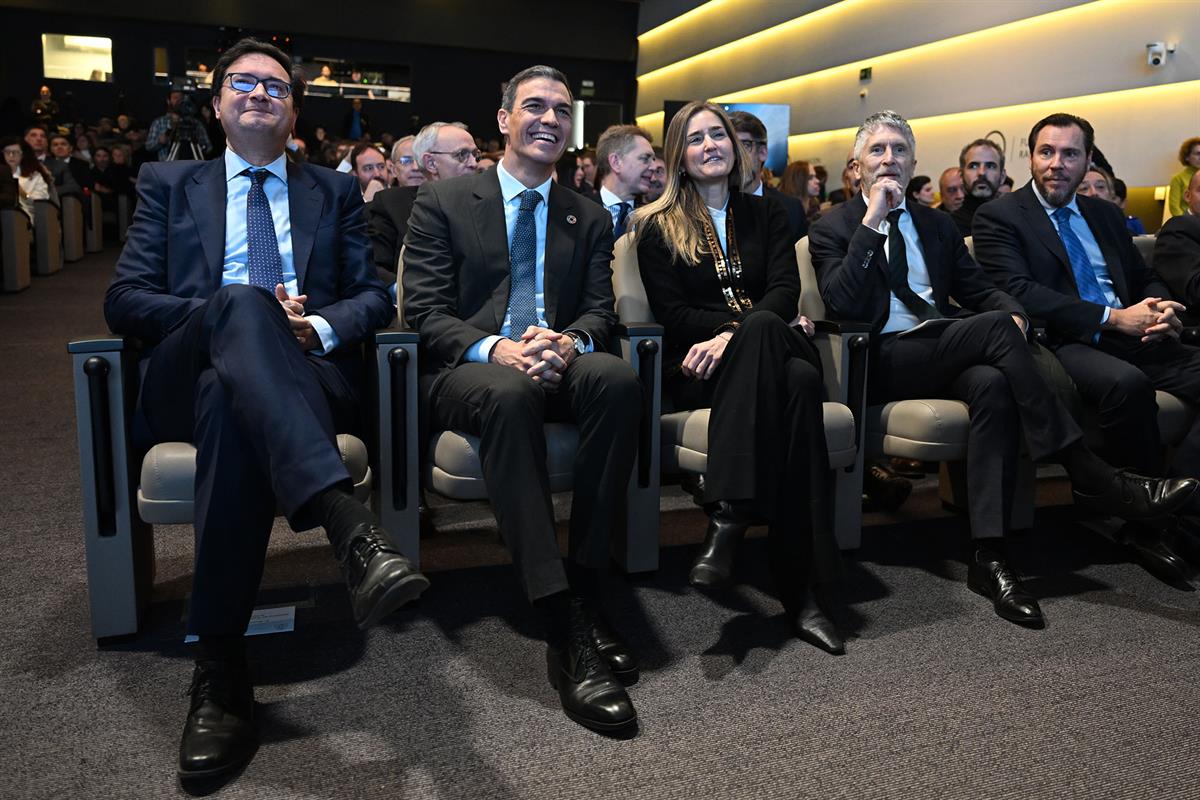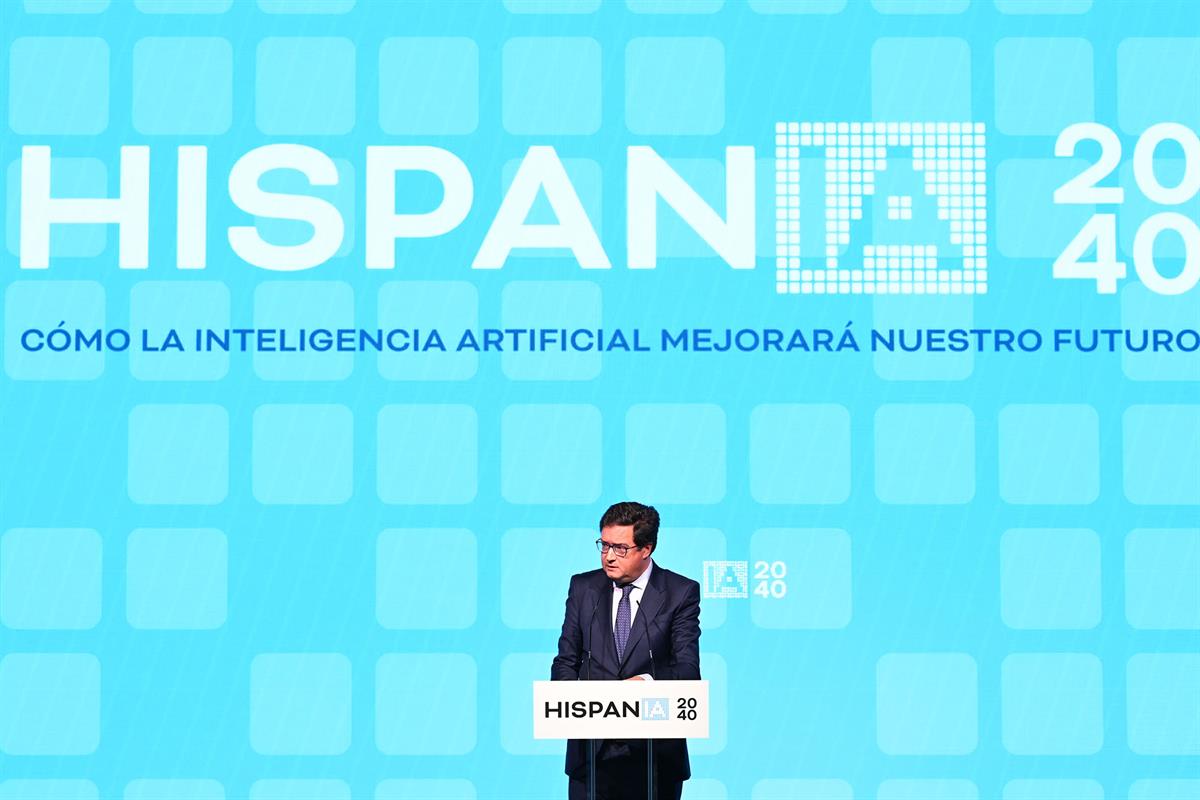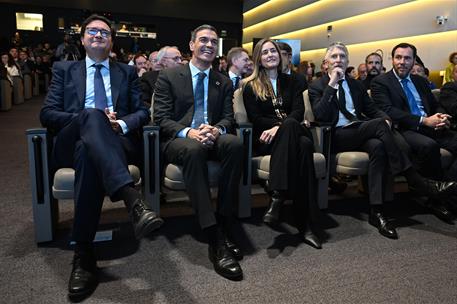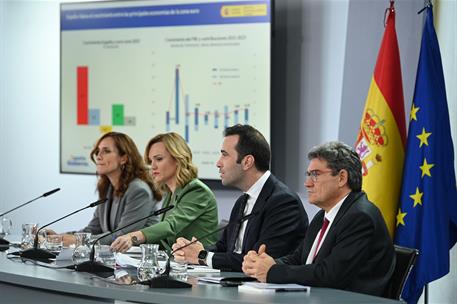Pedro Sánchez: "Democracy is neither 'one euro, one vote', nor 'one tweet, one vote'. Europe must confront this threat and defend democracy"
President's News - 2025.1.20
Images from the closing ceremony | Pool Moncloa/Jorge Villar y Javier Amescua - 2025.1.20
Headquarters of the Ramón Areces Foundation, Madrid
Pedro Sánchez made this statement in his speech at the closing ceremony of the event 'HispanIA: how artificial intelligence will improve our future', held at the headquarters of the Ramón Areces Foundation in Madrid, which was attended by the Third Vice-President and Minister for Ecological Transition and Demographic Challenge, Sara Aagesen; the Minister for Home Affairs, Fernando Grande-Marlaska; the Minister for Transport and Sustainable Mobility, Óscar Puente; the Minister for Agriculture, Fisheries and Food, Luis Planas, and the Minister for Digital Transformation and Public Function, Óscar López, who spoke at the start of the event.
"History has shown us that technologies alone do not generate prosperity. In fact, they tend to reinforce the status quo, giving more power to the powerful and making the rich richer", said Pedro Sánchez, who warned that this threat "is especially serious in a context like the current one, where we are seeing how the Silicon Valley technocast is trying to use its omnipotent power over social networks to control public debate and government action throughout the West". He expressed the need to "stand against this and, of course, propose alternatives," arguing that "democracy is not one euro, one vote, and neither is it one tweet, one vote. It is one person, one vote, and therefore Europe must stand up to this threat and defend democracy".
The President went on to say that we "must have a vision, a clear and shared idea of what kind of AI we want, and what role we want it to play in our society". In this regard, the Government has launched 'HispanIA 2040', a project led by the National Office of Foresight and Strategy, presented at the event and focused on building this integral vision of how artificial intelligence can help resolve some of the major challenges Spain is already facing. The President added that to understand not so much the "how," but the "why" and "what for", we should advocate for this technology.
ALIA goes live: artificial intelligence comes to the Tax Agency and primary care
 Minister Óscar López, the President of the Government of Spain, Pedro Sánchez, the Third Vice-President, Sara Aagesen, and the Ministers Fernando Grande-Marlaska and Óscar Puente during the event | Pool Moncloa/Borja Puig de la Bellacasa
Minister Óscar López, the President of the Government of Spain, Pedro Sánchez, the Third Vice-President, Sara Aagesen, and the Ministers Fernando Grande-Marlaska and Óscar Puente during the event | Pool Moncloa/Borja Puig de la Bellacasa
Following the Government's firm commitment to artificial intelligence in recent years, Pedro Sánchez announced that during this term of office the Government will continue to strengthen capacities in computing and digital infrastructures, moving towards "an integrated data system that facilitates its exchange and use among different actors, promoting scientific research and technological development in AI". In this regard, he announced the release and availability to all users of the first models of ALIA, the family of AI models in Spanish and co-official languages designed to promote research in this field and develop technological solutions in Spanish, the fourth most spoken language in the world and the second most used on the Internet. Work is already underway to apply ALIA in two pilot projects: an internal chatbot that will streamline the work of the Tax Agency and its citizen service; and an application in primary care medicine which, based on advanced data analysis, will allow "an early and more accurate diagnosis of heart failure".
The President of the Government is committed to promoting the integration of AI in public systems and in the productive fabric. He announced that €150 million will be mobilised to promote the integration and use of AI in Spanish companies, in line with the commitment made in the Artificial Intelligence Strategy. €20 million of this amount will soon be earmarked for 500 use cases in small and medium-sized enterprises, the results and experiences of which will be accessible to the entire SME fabric, and "will serve to make them a more innovative and competitive ecosystem".
Spain, "well positioned" to take the lead in AI development and boost its governance
In his speech, Pedro Sánchez stressed that current AI is a technology with "many shortcomings and limitations and, above all, many biases", and "there are human capacities and skills that are difficult for a machine to replicate", such as empathy, instinct, conscience, imagination and the moral sense of human beings, "two capacities that AI will probably never have". However, it is one of the "most transformative and disruptive technologies in history", which "is changing everything and will condition economic competitiveness, social cohesion and the security of nations", which is why he stressed that it is "essential" for Spain to be at the forefront of its development and the adoption of appropriate governance of AI, "although, like the rest of Europe, we are lagging behind".
The "good news", he said, is that Spain is "well positioned" to achieve both, since it has "one of the most advanced cybersecurity ecosystems in the world, and one of the best digital infrastructure networks". In addition, the majority of the population has basic digital skills, and 40% of large companies and 8% of SMEs have already started to incorporate AI into their businesses, which is well above the European average. "Spain is also well positioned to be a global player in the debate on AI governance," he emphasised.
Since the last legislature, the Government has worked with the private sector, civil society and other administrations in this area, and has committed €2 billion in recent years to promote the development of high-impact technologies, including AI solutions, and their adoption in companies and public institutions. Among other actions, the Government has earmarked €50 million to finance major research and development projects, €62 million to create Spain's first AI factory, and a further €105 million to facilitate the deployment of this technology in value chains. The Government has also just committed €500 million for the new semiconductor manufacturing centre in Malaga.
The five gains of AI for Spanish society
According to Pedro Sánchez, in view of the challenge facing Western countries, including Spain, we have a "great task ahead", which involves accelerating the modernisation of the productive fabric, strengthening the welfare state, advancing towards environmental sustainability, reducing inequality and combating social injustice. "I believe in progress. I am convinced that it is possible, and AI can be a decisive tool to achieve it," he added. Without lapsing into "techno-optimism", he cited five "enormous gains" that AI could potentially bring to Spain as a society, as set out in the 'Hispania2040' study. He indicated that AI will help make processes "more efficient" and increase productivity, automating tasks and creating higher quality jobs and high value-added goods and services. This technology could make many basic business tasks 13% more efficient, according to the study.
AI can also optimise and improve the provision of public services, making them faster and more personalised, improving, for example, the efficiency of medical treatments and saving time on administrative tasks to the tune of 5 more daily consultations per doctor in health centres and 22 days less waiting time in hospital specialities. Likewise in the educational field, it will do teachers' bureaucratic tasks, freeing them for a full day a week. AI will also help "pave the way to environmental sustainability" by managing the energy system more efficiently, with a smart grid connecting Spain with the rest of Europe and North Africa. "AI will help us to defend ourselves. It will make our cybersecurity and defence systems more robust and reliable, which is crucial in this new geopolitical stage that is opening up," added Pedro Sánchez, who indicated that Spain will use AI to monitor its borders, protect its critical infrastructure, anticipate threats, detect criminal patterns, and estimate the risk in cases of gender-based violence. It will also optimise processes such as customs control, the management of emergencies due to natural disasters, and the fight against international terrorism.
Óscar López: "Digital transformation must be democratised"
 The Minister for Digital Transformation and Public Function, Óscar López, speaks at the event 'HispanIA 2040: how artificial intelligence will improve our future' | Pool Moncloa/Borja Puig de la Bellacasa
The Minister for Digital Transformation and Public Function, Óscar López, speaks at the event 'HispanIA 2040: how artificial intelligence will improve our future' | Pool Moncloa/Borja Puig de la Bellacasa
"We are not prepared to miss out on this revolution. We have missed out enough in the past. Spain wants to be at the digital forefront. It wants to focus on supercomputing, semiconductors and AI, because we see it as an opportunity rather than a threat. A huge opportunity. If we use it responsibly, it will help us achieve a more prosperous, fairer and more sustainable society," concluded Pedro Sánchez.
Along these lines, the Minister for Digital Transformation and Public Function, Óscar López, defended the Government's commitment to "democratising digital transformation", reviewing the progress made with the National AI Strategy. Actions to this effects include the National Neurotechnology Centre (Spain Neurotech), via which "great advances" are expected to be made in the treatment of neurological diseases such as Parkinson's, Alzheimer's, depression and sleep disorders; and the location in Spain of one of the seven European AI factories, thanks to the Government's investment of €62 million, which positions the National Supercomputing Centre as a world reference. Furthermore, more than 600,000 SMEs and the self-employed have received aid under the Digital Kit programme to digitise and incorporate AI into their businesses.
Non official translation






